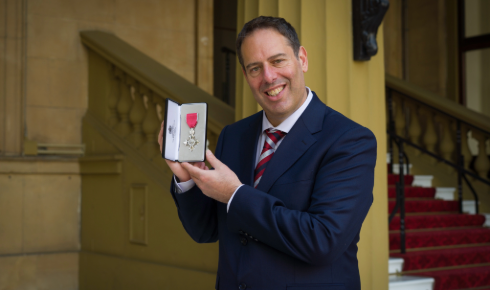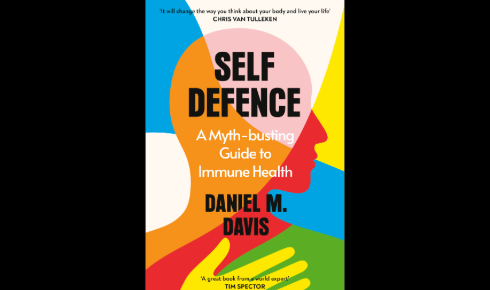Vitamin C: cold comfort?

8 September 2025
Daniel M Davis explores the strange history behind the idea that vitamin C can help prevent colds
In his new book, Self Defence: A Myth-busting Guide to Immune Health, chair of The Biologist’s editorial board Daniel M Davis examines the effects of stress, diet, exercise, the microbiome and more on our immune health, empowering us to make informed choices based on the very latest scientific experiments. This exclusive extract explores the long-standing idea that vitamin C can prevent or treat colds, and whether there is any evidence for it at all.
Extract from Self Defence By Daniel M Davis
Every year, as a professor of immunology, I give talks to three different audiences: other scientists, students and the public. My talks to other scientists will be greeted with a ripple of applause, and then some of them will stand up to challenge me, as they should, on the details of my team’s recent experiments. To almost anyone outside the room, their questions would be impenetrable, couched as they are in a specialised vocabulary of names and abbreviations, necessary to communicate nuances. (Did you check if the TCR is triggered? Great question; we’re studying that now.) After a while you get used to the jamboree of C3PO- and R2D2-like jargon.
At my lectures to students there isn’t usually much applause, but their enthusiasm shows in other ways. Sometimes I’ll be cornered, or emailed later, to clarify some details (or check what’s examinable). It’s after a talk to the general public that the applause is the most generous. Then follows – every time – a series of seemingly simple but actually difficult questions, mostly, if not exclusively, about how to achieve good immune health. Is it true that orange juice can help ward off colds? How does age effect our immune system? Is mental health really connected to inflammation? How important is vitamin D?
During a brief Q&A there isn’t time to answer these questions properly, because more than a snappy sentence or two is required. To answer such questions, and others like them, we need to take a deep dive into the immune system in all its complexity, and the vital role it plays in illnesses – pretty much all of them. Some things are proven to help, others will only help certain people, and a lot of things – while not without some level of scientific backing – are much more speculative than the advertising slogans would have you believe.
My research team and I have been digging away for more than two decades to help show how immune cells recognise the presence of diseased cells in the body, and how different types of immune cell communicate with one another. And we are just one research team: around the world, thousands more are doing incredible work. What’s genuinely exciting is that sufficient knowledge has built up so we can now truly begin to understand what really affects immune health. It is only with this understanding that we can make more informed choices in how we live.
One story about nutrition and immune health helps inform and forearms us about anything else, because it is a controversy we have been thinking about and studying for over half a century already. A lot of information has accumulated, and the truth is that we have been misled for decades.
There is no question that vitamin C is important to health. It is a strong antioxidant, meaning it neutralises the activity of unstable atoms or molecules, called free radicals, which arise from pollutants, toxins and everyday body processes. Vitamin C also helps the body take up iron, and it is involved in the production of many proteins and chemicals vital to the human body. But does it also cure a cold?
For over 50 years, the idea that vitamin C can cure a cold has had a stranglehold on the popular imagination. This is thanks to Linus Pauling, a double-Nobel-Prize-winning scientist based in the US. Without Pauling’s public advocacy and attitude, we would not think of vitamin C as we do today.
Pauling is often said to be one of the greatest chemists of the 20th century. After his father died when he was nine, he found solace in books and devoted himself to science, against his mother’s wishes, often reading scientific papers to look for problems he could think about and solve. By the age of 30 he had published over 50 scientific papers. In mid-February 1931, around the same time as his second son was born, he finished a landmark paper, ‘The nature of the chemical bond’. It was published without the normal scrutiny because the journal’s editor decided there wasn’t anyone else in the world with enough expertise to critically evaluate it.
Needless to say, for somebody who won two Nobel Prizes, Pauling always worked hard. He had a knack for thinking through issues clearly and working out the overarching rules and principles: “I like to take a very complicated subject where there is no order … and think about it for a long enough period that I can find some way of introducing order into it.” But already there lies a problem. Precise and exact rules work exceptionally well for making sense of isolated chemical reactions, but not so easily for the human body, let alone something as vast as immune health and nutrition. There are just too many variables.
 Daniel M Davis FRSB MBE is professor of immunology and head of life sciences at Imperial College London, and has studied the immune system for more than two decades
Daniel M Davis FRSB MBE is professor of immunology and head of life sciences at Imperial College London, and has studied the immune system for more than two decades
In 1940, Linus Pauling began making political speeches against fascism and arguing that the US should prepare to enter the war; years later, when he read in a newspaper that Hiroshima had been destroyed by the atomic bomb, he called it the ‘‘ultimate immorality”. His stature continued to grow. His textbook for undergraduates, General Chemistry, sold well and made him wealthy.
In 1958, he published a book provocatively entitled No More War. By this time, he had already won a Nobel Prize for Chemistry for his research in understanding chemical bonds. In 1962, he won the Nobel Prize for Peace for his activism against nuclear bombs. So by the time he turned to biology and human health, and specifically vitamin C, he was famous, and the public were primed to listen to him.
In 1965, Pauling read a book about high doses of the B vitamin niacin helping people with schizophrenia (an idea not supported today). Something about this struck him as strange. With most drugs, there’s a limit to how much can be safely taken. Too much aspirin or paracetamol can be fatal, for example. A new idea germinated in his mind. Could there be something special about vitamins that made them safe and effective in large doses?
 Pauling cherry-picked results in scientific journals to fit his narrative before publishing his best-selling book Vitamin C and the Common Cold
Pauling cherry-picked results in scientific journals to fit his narrative before publishing his best-selling book Vitamin C and the Common Cold
Pauling was in contact with the scientists Albert Szent-Györgyi, renowned for his discovery of vitamin C, and Irwin Stone, who helped develop processes for using vitamin C in food preservation that are still used today (often labelled as ascorbic acid). Stone claimed that extremely high doses of vitamin C helped him and his wife heal after a car crash.
Certainly it is very hard to know how much of any molecule is needed for the human body to function well. What’s more, together Pauling, Stone and Szent-Györgyi realised that the intake of vitamin C recommended at the time was set according to the level at which it prevents the disease scurvy. This, they argued, was not necessarily what might be optimal. So Pauling and his wife began taking very high doses themselves: 3,000mg a day. For comparison, the current recommended level in the UK is 40mg a day. But Pauling and his wife came to feel a mega-dose gave them extra energy and stopped them catching colds.
Pauling scoured scientific journals, cherry-picking results that fitted his narrative. In 1970, his best-selling book was published: Vitamin C and the Common Cold, in which he claimed that everyone’s health could be improved by high levels of vitamin C. Timing helped: the counterculture of the late 1960s had already put a spotlight on whole foods and natural remedies. Sales of vitamin C surged. New factories were built to keep up with demand, despite many healthcare and scientific professionals maintaining that the evidence was not there, that no one could say how vitamin C helped against colds. Pauling countered by criticising the whole pharmaceutical industry for seeking to uphold the status quo because their own cold remedies were so lucrative.
 In Self Defence: A Myth-busting Guide to Immune Health, Daniel M Davis examines the effects of stress, diet, exercise, the microbiome and more on our immune health
In Self Defence: A Myth-busting Guide to Immune Health, Daniel M Davis examines the effects of stress, diet, exercise, the microbiome and more on our immune health
So what is the truth? Systematic reviews collect data available from all trials that fit pre-specified criteria. In 2013, a search for all placebo-controlled trials testing the effect of high levels of vitamin C on colds uncovered 29 trials involving over 11,000 people. The conclusion from all this data was that, for the general population, vitamin C does not reduce the chance of catching a cold.
However, for reasons unknown, people taking regular supplements of vitamin C did experience cold symptoms for slightly less time. To be precise, regular supplementation of daily vitamin C reduced the duration of a cold by 8% in adults and 14% in children. In other words, for a cold lasting a few days, someone taking regular vitamin C supplements might feel better a few hours earlier.
Future research may clearly establish specific situations or groups of people for which vitamin C is important for immune health. But in the meantime, many of us simply believe vitamin C protects against colds far more than it really does, unaware that this is largely down to one man’s crusade. All these years after Pauling’s 1970 book, we still tout the idea of orange juice helping us fight off colds without giving much thought to its credentials or veracity.
On the flip side, there is much stronger evidence that vitamin D is important for immune health. And genes, diet, stress, exercise, the microbiome, mental health, sleep and so on, all play a role here too [each properly discussed in Self Defence]. But from all the twists and turns in the decades-long debate about vitamin C and colds, a lesson emerges: how hard it is to really know.
We certainly don’t yet understand everything. Many questions I get asked remain hard to tackle. How does burnout impact immune health? How do ultra-processed foods affect the immune system? Is there any truth in the idea of man flu? In most cases the science is still ongoing. But ever since Jenner first vaccinated a young boy more than 220 years ago, there’s been an enormous global endeavour to understand how the immune system really works. By journeying through the science – by carefully and honestly answering some key questions and exposing some long-held, yet harmful beliefs – we can come away able to make more informed choices about all manner of ideas and products for living healthier, happier and stronger lives.
Excerpt from Self Defence: A Myth-busting Guide to Immune Health (Vintage, 2025) by Daniel M Davis.
Daniel M Davis FRSB MBE is Professor of Immunology and Head of Life Sciences at Imperial College London


